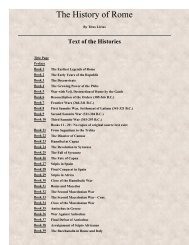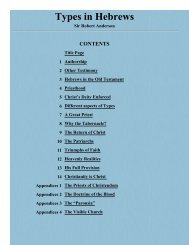The Person of the Holy Spirit - Table of Contents
The Person of the Holy Spirit - Table of Contents
The Person of the Holy Spirit - Table of Contents
You also want an ePaper? Increase the reach of your titles
YUMPU automatically turns print PDFs into web optimized ePapers that Google loves.
1. <strong>The</strong> Meaning <strong>of</strong> Inspiration.<br />
<strong>The</strong> technical meaning <strong>of</strong> inspiration is quite apart from its common usage in reference to non-Biblical concepts. As B. B.<br />
Warfield points out, “<strong>The</strong> word ‘inspire’ and its derivatives seem to have come into Middle Eng. from <strong>the</strong> Fr., and have been<br />
employed from <strong>the</strong> first (early in <strong>the</strong> 14th cent.) in a considerable number <strong>of</strong> significations, physical and metaphorical,<br />
secular and religious.”4 We still speak <strong>of</strong> being inspired by a beautiful sunset, or <strong>of</strong> hearing an inspiring sermon. Such<br />
common usages, however, are not parallel to inspiration in a doctrinal sense. Even in ordinary speech, we conceive <strong>of</strong><br />
inspiration as something that constitutes an influence from without. As Warfield says, “Underlying all <strong>the</strong>ir use, however, is<br />
<strong>the</strong> constant implication <strong>of</strong> an influence from without, producing in its object movements and effects beyond its native, or at<br />
least its ordinary powers.”5<br />
Turning to <strong>the</strong> Scriptures, we observe a paucity <strong>of</strong> reference to <strong>the</strong> word inspiration as far as <strong>the</strong> term itself is concerned. In<br />
Job 32:8, Elihu is quoted, “But <strong>the</strong>re is a spirit in man: and <strong>the</strong> inspiration <strong>of</strong> <strong>the</strong> Almighty giveth <strong>the</strong>m understanding.” This<br />
can hardly be referred to <strong>the</strong> inspiration <strong>of</strong> Scripture, however, as it is doubtful if any <strong>of</strong> <strong>the</strong> Bible, in its present form at<br />
least, was in existence at that time. <strong>The</strong> only o<strong>the</strong>r reference is found in 2 Timothy 3:16, where <strong>the</strong> Authorized Version gives<br />
this translation, “All scripture is given by inspiration <strong>of</strong> God, and is pr<strong>of</strong>itable for doctrine, for repro<strong>of</strong>, for correction, for<br />
instruction in righteousness.” Even here, in <strong>the</strong> American revision, <strong>the</strong> translation is changed to read, “Every scripture<br />
inspired <strong>of</strong> God is also pr<strong>of</strong>itable for teaching, for repro<strong>of</strong>, for correction, for instruction which is in righteousness.” <strong>The</strong><br />
revised translation, while attempting to solve <strong>the</strong> problem created by <strong>the</strong> absence <strong>of</strong> <strong>the</strong> copula, not at all unusual in <strong>the</strong><br />
Greek, has greatly weakened <strong>the</strong> passage, and that, unjustly. <strong>The</strong> noun inspiration would disappear entirely from <strong>the</strong> English<br />
Bible if this translation were allowed, and a misleading impression is created that some Scripture is not inspired.<br />
<strong>The</strong> difficulty lies chiefly in <strong>the</strong> word inspiration itself. <strong>The</strong> Greek, θεο•πνευστος, really does not mean inspiring at all. As<br />
Warfield notes, “<strong>The</strong> Gr term has, however, nothing to say <strong>of</strong> inspiring or <strong>of</strong> inspiration: it speaks only <strong>of</strong> a ‘spiring’ or<br />
‘spiration.’ What it says <strong>of</strong> Scripture is, not that it is ‘brea<strong>the</strong>d into by God’ or is <strong>the</strong> product <strong>of</strong> <strong>the</strong> Divine ‘inbreathing’ into<br />
its human authors, but that it is brea<strong>the</strong>d out by God, ‘God-brea<strong>the</strong>d,’ <strong>the</strong> product <strong>of</strong> <strong>the</strong> creative breath <strong>of</strong> God. In a word,<br />
what is declared by this fundamental passage is simply that <strong>the</strong> Scriptures are a Divine product, without any indication <strong>of</strong><br />
how God has operated in producing <strong>the</strong>m.”6<br />
From 2 Timothy 3:16, we may conclude that inspiration is <strong>the</strong> work <strong>of</strong> God by which or through which <strong>the</strong> Scriptures are<br />
given. After stating <strong>the</strong> fact <strong>of</strong> inspiration, however, <strong>the</strong> same verse draws a most interesting and significant conclusion.<br />
Because <strong>the</strong> Scriptures are inspired, <strong>the</strong>y are, <strong>the</strong>refore, pr<strong>of</strong>itable for doctrine, repro<strong>of</strong>, correction, and instruction in<br />
righteousness. In o<strong>the</strong>r words, inspiration guarantees accuracy, and gives divine authority to <strong>the</strong> record. It is hardly<br />
necessary here to review <strong>the</strong> abundant testimony <strong>of</strong> <strong>the</strong> Scriptures to this very fact. Christ Himself frequently quoted <strong>the</strong> Old<br />
Testament as <strong>the</strong> Word <strong>of</strong> God. <strong>The</strong> writers claimed inspiration for <strong>the</strong>ir own works. <strong>The</strong> content <strong>of</strong> Scriptures is such that<br />
its prophecies must have been <strong>the</strong> product <strong>of</strong> divine revelation and <strong>the</strong>ir accurate recording <strong>the</strong> work <strong>of</strong> inspiration. <strong>The</strong><br />
witness to inspiration is all <strong>the</strong> more conclusive because <strong>the</strong> Scriptures never attempt to prove inspiration; <strong>the</strong>y merely state<br />
it and assume it, in <strong>the</strong> same manner as <strong>the</strong> Scriptures assume <strong>the</strong> existence <strong>of</strong> God.<br />
A matter <strong>of</strong> fur<strong>the</strong>r observation is that <strong>the</strong> Scriptures are not only divine, but also human. <strong>The</strong> words used were those within<br />
<strong>the</strong> vocabulary <strong>of</strong> <strong>the</strong> writers. <strong>The</strong>ir own emotions, human knowledge, experiences, and hopes entered into <strong>the</strong> Scriptures<br />
which <strong>the</strong>y wrote, without compromising in <strong>the</strong> least <strong>the</strong>ir inspiration. Without doubt, some portions <strong>of</strong> Scripture are<br />
dictated, as <strong>the</strong> Scriptures <strong>the</strong>mselves indicate, but most <strong>of</strong> <strong>the</strong> Scriptures do not have this characteristic. Regardless <strong>of</strong> <strong>the</strong><br />
degree <strong>of</strong> human or divine influence in <strong>the</strong> Scriptures, <strong>the</strong> resultant is equally inspired and equally suited to God’s purpose.<br />
<strong>The</strong> examination <strong>of</strong> <strong>the</strong> work <strong>of</strong> <strong>the</strong> <strong>Holy</strong> <strong>Spirit</strong> in inspiration will sustain <strong>the</strong>se evidences for <strong>the</strong> dual authorship, divine and<br />
human, <strong>of</strong> <strong>the</strong> Scriptures. fact <strong>of</strong> <strong>the</strong> inspiration <strong>of</strong> <strong>the</strong>ir writings is more assumed than proved. Occasional reference is found<br />
to <strong>the</strong>ir own consciousness <strong>of</strong> <strong>the</strong> work <strong>of</strong> <strong>the</strong> <strong>Holy</strong> <strong>Spirit</strong> in inspiration. David bears witness to <strong>the</strong> inspiration <strong>of</strong> his works,<br />
“<strong>The</strong> <strong>Spirit</strong> <strong>of</strong> <strong>the</strong> LORD spake by me, and his word was in my tongue. <strong>The</strong> God <strong>of</strong> Israel said, <strong>the</strong> Rock <strong>of</strong> Israel spake to<br />
me” (2 Sam 23:2-3). Isaiah records <strong>the</strong> words <strong>of</strong> <strong>the</strong> Lord, bearing a similar import, “As for me, this is my covenant with<br />
<strong>the</strong>m, saith <strong>the</strong> LORD; My spirit that is upon <strong>the</strong>e, and my words which I have put in thy mouth, shall not depart out <strong>of</strong> thy<br />
mouth, nor out <strong>of</strong> <strong>the</strong> mouth <strong>of</strong> thy seed, nor out <strong>of</strong> <strong>the</strong> mouth <strong>of</strong> thy seed’s seed, saith <strong>the</strong> LORD, from henceforth and for








